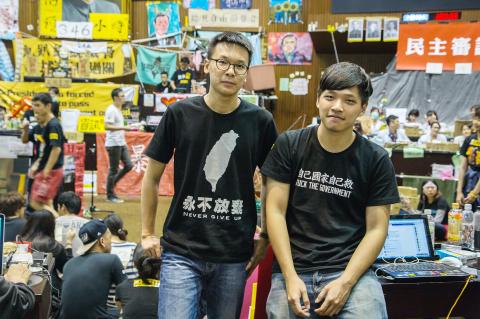Lin Fei-fan (林飛帆) and Chen Wei-ting (陳為廷), leaders of the ongoing student movement against the cross-strait service trade agreement, may face legal action for their involvement in the occupation by hundreds of students of the Legislative Yuan.
Local media reported yesterday that Lin and Chen have been referred by the police to the Taipei District Prosecutors’ Office for investigation on five charges: trespassing, interference with public functions, destruction of property, infringing on personal liberty and contempt of authority.
However, the office dismissed the report, saying that the pair had been accused by four anonymous individuals, not referred by the police.

Photo: Lam Yik Fei, Bloomberg
“The charges against the pair are being investigated,” the office said, adding that there were other people who had also filed lawsuits against the student activists and that their accusations would be handled according to the law.
As to when and whether Lin and Chen would be summoned for questioning, the office said: “The prosecutors responsible for the cases will make the decisions based on the progress of their investigations.”
However, sources familiar with the matter told the Chinese-language Liberty Times (the Taipei Times’ sister newspaper) that the office planned to question the pair after the Sunflower movement died down to avoid exciting the protesters inside and outside the Legislative Yuan.
So far, 43 people, including Lin and Chen, face legal action over their participation in the occupation of the legislature and the brief seizure of the Executive Yuan on Sunday last week, the sources said.
Lin and Chen said yesterday that they would take responsibility for their actions, but insisted that they are not guilty of any crimes.
“What we are doing is not illegal at all,” Chen told journalists in the legislative chamber. “But if prosecutors want to take any legal action against us, we will face it, shoulder it together and not try to dodge it.”
In related developments, an online petition launched on Tuesday by a group of 38 law professors that urges the Taipei District Prosecutors’ Office to investigate the government’s forced eviction of protesters from the Executive Yuan on Monday last week has attracted about 950 signatures.
The signatories include National Taiwan University (NTU) College of Law dean Shieh Ming-yan (謝銘洋), Fu Jen Catholic University School of Law dean Chang Yie-yun (張懿云) and National Taipei University Department of Law director Lin Kuo-bin (林國彬).
The petition makes three major demands: that prosecutors uncover the truth of what happened during the forced eviction of students; that all relevant evidence be carefully protected, including video footage from surveillance cameras around the Executive Yuan and the telephone records of senior government officials; and that prosecutors ascertain whether riot police attacked unarmed protesters with batons or overstepped their powers when trying to disperse them.
Riot police were caught on camera using force and water cannons to remove protesters from the Executive Yuan.
About 110 people were injured during the eviction process, including police officers and a lawmaker.
Additional reporting by Loa Iok-sin and Yang Kuo-wen

CARROT AND STICK: While unrelenting in its military threats, China attracted nearly 40,000 Taiwanese to over 400 business events last year Nearly 40,000 Taiwanese last year joined industry events in China, such as conferences and trade fairs, supported by the Chinese government, a study showed yesterday, as Beijing ramps up a charm offensive toward Taipei alongside military pressure. China has long taken a carrot-and-stick approach to Taiwan, threatening it with the prospect of military action while reaching out to those it believes are amenable to Beijing’s point of view. Taiwanese security officials are wary of what they see as Beijing’s influence campaigns to sway public opinion after Taipei and Beijing gradually resumed travel links halted by the COVID-19 pandemic, but the scale of

TRADE: A mandatory declaration of origin for manufactured goods bound for the US is to take effect on May 7 to block China from exploiting Taiwan’s trade channels All products manufactured in Taiwan and exported to the US must include a signed declaration of origin starting on May 7, the Bureau of Foreign Trade announced yesterday. US President Donald Trump on April 2 imposed a 32 percent tariff on imports from Taiwan, but one week later announced a 90-day pause on its implementation. However, a universal 10 percent tariff was immediately applied to most imports from around the world. On April 12, the Trump administration further exempted computers, smartphones and semiconductors from the new tariffs. In response, President William Lai’s (賴清德) administration has introduced a series of countermeasures to support affected

Pope Francis is be laid to rest on Saturday after lying in state for three days in St Peter’s Basilica, where the faithful are expected to flock to pay their respects to history’s first Latin American pontiff. The cardinals met yesterday in the Vatican’s synod hall to chart the next steps before a conclave begins to choose Francis’ successor, as condolences poured in from around the world. According to current norms, the conclave must begin between May 5 and 10. The cardinals set the funeral for Saturday at 10am in St Peter’s Square, to be celebrated by the dean of the College

CROSS-STRAIT: The vast majority of Taiwanese support maintaining the ‘status quo,’ while concern is rising about Beijing’s influence operations More than eight out of 10 Taiwanese reject Beijing’s “one country, two systems” framework for cross-strait relations, according to a survey released by the Mainland Affairs Council (MAC) on Thursday. The MAC’s latest quarterly survey found that 84.4 percent of respondents opposed Beijing’s “one country, two systems” formula for handling cross-strait relations — a figure consistent with past polling. Over the past three years, opposition to the framework has remained high, ranging from a low of 83.6 percent in April 2023 to a peak of 89.6 percent in April last year. In the most recent poll, 82.5 percent also rejected China’s